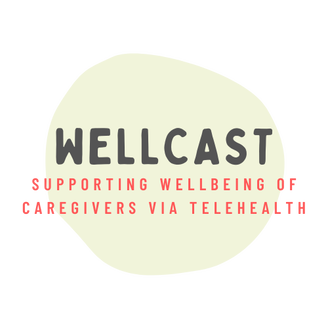
Welcome to Project WellCAST!
We know that caregivers of children with neurogenetic syndromes are under a lot of stress, and sometimes it can be hard to find providers who know about your loved one’s condition. We know it can be difficult to have to explain life as a caregiver to people who haven’t engaged with the syndrome community before. Project WellCAST is a research study that aims to fill these gaps by determining how to best provide appropriate, evidence-based support to rare disorder caregivers virtually.
Project WellCAST started in 2019 as a partnership between patient foundations, researchers, and clinicians who were interested in helping families of children with rare disorders access evidence-based treatments from home. Through Project WellCAST, we study how a variety of remotely-accessed resources and therapies might impact the lives of rare disorder caregivers.
We are currently recruiting participants for Project WellCAST 3.0. This version of the study was funded by a large grant from the National Institutes of Health and will enroll up to 1,000 caregivers across a three year period. This page will share more about Project WellCAST and how your family may be able to get involved!
What is Project WellCAST?
Project WellCAST is a NIH-funded clinical trial that aims to support caregiver well-being through supportive therapy, resources, and family friendly treatment. This research study will include up to 1,000 caregivers of children with a variety of neurogenetic syndromes associated with intellectual disability, including (but not limited to) Angelman syndrome, Down syndrome, Dup15q syndrome, fragile X syndrome, Prader Willi syndrome, and Williams syndromes.
Our goal is to understand which supports and therapies are best suited to the needs of rare disorder caregivers. To accomplish this goal, participants will be assigned to receive a resource or evidence-based therapy that is commonly used in clinical settings. Supports formats vary and may include self-guided resources, peer coaching, individual therapies, or group therapies. The focus of support also differs; some programs focus on your well-being as a caregiver, and others focus on helping you to support your child's development. By trying many types of treatment across many different people, we want to learn which of these evidence-based supports are best for rare disorder caregivers with a variety of backgrounds, strengths, and needs.
Because this is a research study, families will be assigned to a support program and cannot select which type of support they receive. However, families will be given the option to decline any type of support prior to enrolling in the project and, once they do enroll, may stop participating in the study at any time, without penalty. If the current WellCAST phase is full, some families will also be offered the opportunity to join a waitlist for the next cycle of treatment.
Data collection is an important part of Project WellCAST. We will collect data from participants across a variety of methods, including interviews, questionnaires, and smartphone-based "snapshot surveys" that measure participants' experiences as they go about their daily lives.
Participating in Project WellCAST is free, and we provide all of the technology and tools you will need to participate. Participants receive up to $100 for sharing data with us throughout the study. In total, Project WellCAST activities span approximately 6.5 months, including 2 weeks of baseline data collection, 12 weeks of a support program, and 2 weeks of follow-up data collection. There is some “down time” between phases during which no data collection occurs.
Project WellCAST is open to caregivers from a variety of backgrounds, races, ethnicities, and identities. Within Project WellCAST, Black caregivers are eligible for additional culturally-informed treatments focused on experiences of racism and discrimination. These support groups are available regardless of the other types of supports caregivers are assigned to receive.
Who is eligible?
Eligibility varies across support options. However, general eligibility criteria include:
- Caregiver (age 18+) of a child ages 2-35
- Child must have a documented neurogenetic condition typically associated with intellectual disability and/or developmental delays; condition may not be neurodegenerative in nature
- Caregiver must reside in the US and be fluent in English
- Additional eligibility criteria may apply.
How do I learn more?
If you would like to learn more or determine if you are eligible to participate, please email us at [email protected].
This project is funded by the National Institutes of Health
IRB-2022-1580, PI Dr. Bridgette Kelleher

